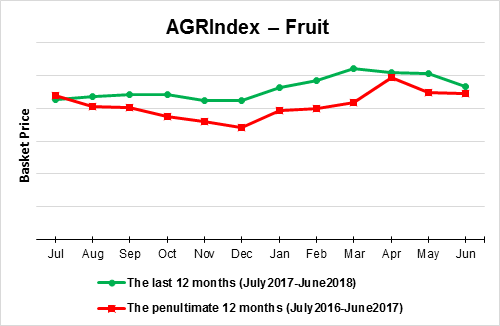
In June 2018, FRUIT prices continued their recent declining trend — the m/m change last month ...
Read more


ISET-PI has begun publication of a new product – the Budget Execution Monitor (BEM). The goal of the BEM is to forecast revenues and expenditures of the general government of Georgia for the cu...
Read more

In July 2016, the consumer confidence index (CCI) sustained its upward trend, now lasting for six consecutive months.
The monthly increase in the overall index was 2.8 points, but in absolute terms consumer confidence is deeply in the negative, currently standing at -24.2 points. This means that those people who answer the questions about their current situation and their expectations pessimistically outnumber those who give positive answers. -24.2 is much better than the CCI’s all-time low that occurred in September 2015, when it reached -40.4 points.
It is interesting to note that the CCI is computed in many countries using the same methodology, and it is not everywhere constantly in the negative as it is in Georgia. In the UK, for example, the CCI was constantly positive from January 2015 until February 2016, reaching more than +6 in August 2015. Historically, there even were times when consumer confidence in UK and other countries exceeded +15. In Georgia, on the other hand, the best CCI was measured in July 2014, with a value of -11.4.
In July 2016, the expectations index, derived from questions about future economic prospects of the respondents, went up by 1.5 points, while the present situation index, derived from questions about the current economic circumstances, went up by 4.1 points.
The main drivers of the positive changes in July were: less negative perceptions about the economic situation in the last 12 months and greater willingness to making major purchases. However, the upswing in July took place on a broad front: out of the answers to 12 questions, 11 changed positively compared to August, and the only negative aspect was an increased fear of inflation (more people expect that prices will rise over the next 12 months).
Most important CCI developments:
The monthly changes of the CCI in different strata of the society was the following: For those above 35, the consumer confidence improved both in its present situation as well as in its expectations component. For those below the age of 35, the development was less positive. The CCI has generally improved significantly for males, while females’ expectation went down. The overall CCI has improved for all education levels but the change was more positive for those with higher education.
| Sub-Group | Present Situatuation | Expectations | Overal CCI |
| AGE | |||
| 35 and below | -31.5 (down 1.5 points) | -11.0 (up by 1.2 points) | -21.1 (down by 0.2 point) |
| Over 35 | -34.9 (up 9.2 point) | -16.8 (up by 2.5 points) | -25.9 (up by 5.9 points) |
| GENDER | |||
| Male | -29.1 (up by 8.8 points) | -13.9 (up by 3.7 points) | -21.5 (up by 6.3 point) |
| Female | -37.5 (up by 0.1 points) | -15.6 (down by 3 points) | -26.5 (down by 0.5 points) |
| EDUCATION | |||
| Higher education | -25.9 (up by 6 point) | -10.7 (up by 4.9 points) | -18.3 (up by 5.5 points) |
| The rest | -39.1 (up by 1.8 points) | -17.9 (down by 1.3 points) | -28.7 (up by 0.2 points) |
In July, the overall consumer confidence index increased less strongly in Tbilisi compared to the rest of Georgia (RoG), and in this way it almost entirely converged to the same absolute value (consumer confidence had in the preceding months been weaker in RoG than in Tbilisi). The overall index gained 1.7 points in Tbilisi, reaching -24.1 points, while in the RoG the index gained 3.4 points, reaching - 24.2 points.
| Tbilisi | Rest of Georgia (RoG) | |
| Overall CCI | -24.1 (up by 1.7 point) | -24.2 (up by 3.4 poits) |
| Present Situation Index | -30.9 (up by 2 point) | -35.1 (up by 5.4 points) |
| Expectations Index | -17.3 (up by 1.3 point) | -13.4 (up by 1.5 points) |
| Expectations-Present Gap | 13.6 points | 21.6 points |
In Tbilisi, the improvement of the index was mainly driven by more optimistic assessments of the present and expected financial situations of households as well as a more positive perception of how the general economic situation has evolved over the last 12 months.
As for the rest of Georgia (RoG), the change in the index was caused by a more positive assessment of the general economic situation over the last 12 months as well as by better employment prospects and plans to make major purchases.